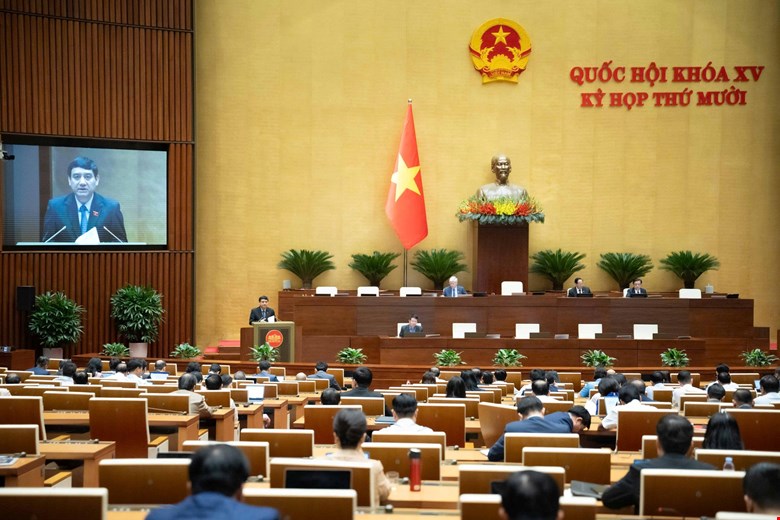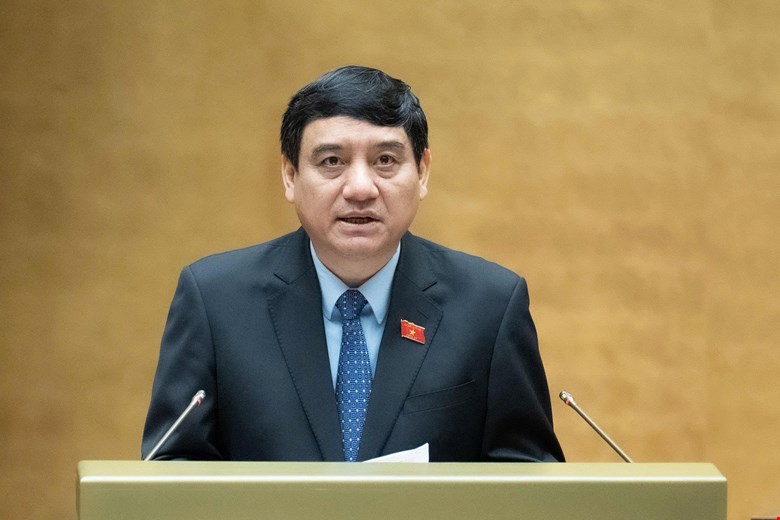Opening up bottlenecks, creating a new legal corridor, strong enough to shake and develop breakthroughs in Vietnam's education
The above content was clearly stated by the Ministry of Education and Training (MOET) in the Draft Resolution of the National Assembly on a number of specific and outstanding mechanisms and policies to implement the breakthrough in education and training development, submitted to the National Assembly this morning, November 17.
According to the Ministry of Education and Training, after more than 10 years of implementing Resolution No. 29-NQ/TW, Vietnam's education has achieved many important achievements, but is facing a systematic crisis. "Bottlenecks" in institutions, human resources, finance and international integration are hindering breakthrough development, revealing the compatible between the strategic importance of education and the current administrative management mechanism.

The bottlenecks are pointed out as: Inadequacies and overlaps in institutions and policies; limitations in financial and investment resources; State budget expenditure for education has not reached the minimum of 20% of total expenditure according to the policy; barriers to international integration and socialization of education;
Along with that is the alarming situation of the teaching staff and managers. There is a serious shortage of preschool and primary school teachers with a scale of over 100,000 people, while the treatment, salary and allowance policies are not attractive enough, leading to the situation of teachers quitting or changing jobs, directly affecting the quality of teaching and implementing new programs.
"The limitations of this system require a specific, unified and highly effective legal tool. The issuance of a special Resolution of the National Assembly is an urgent requirement to open up bottlenecks, create a new legal corridor, strong enough to shake and develop Vietnam's education in the coming period" - the submission clearly stated.
Based on the direction in Resolution No. 71-NQ/TW of the Politburo and Resolution No. 158/NQ-CP of the Government, the Ministry of Education and Training has reviewed and selected key, urgent, and breakthrough issues, ensuring clear goals, clear solutions, clear responsibilities and feasibility, and fully institutionalizing the Party's policies in the spirit of Resolution No. 71-NQ/TW.
The draft Resolution consists of 11 Articles, of which Articles 3 to 8 stipulate 5 groups of basic policies.
In the policy group on developing the team of teachers, managers and human resources for education, the draft stipulates specific and outstanding incentive policies for the team of teachers and staff in educational institutions; gives authority to the Department Director in recruitment, transfer, and secondment to ensure unified management of human resources in the sector; at the same time, issue a mechanism to attract, promote and develop high-quality human resources in teaching, research, and management.

With a group of policies on innovating mechanisms, programs and education systems, the draft stipulates a mechanism to ensure comprehensive autonomy for higher education and vocational education institutions; innovating preschool, general education, university and continuing education programs; organizing the unified use of a set of textbooks nationwide; building an open, interconnected education system, promoting lifelong learning and a learning society.
In the group of policies on finance, investment and incentives for education, the draft stipulates that the state budget expenditure for education should reach at least 20% of total expenditure, including ensuring the development investment expenditure ratio and prioritizing preschool, general education, and disadvantaged areas; promulgating a financial mechanism to encourage public-private partnership, socialization; special incentives for land, taxes, credit for public and non-profit educational institutions, ensuring fairness and sustainability in investment in education, etc.
In addition, the draft also stipulates issues not regulated by law such as: Mechanism for digital transformation, science, technology and innovation in education; ) Mechanism for international cooperation and integration in education; Preferential and outstanding policies on land, taxes and resources for education; free textbooks for students of general education institutions (to be completed by 2030) and free tuition and textbooks on National Defense and Security Education at higher education institutions, vocational education.
Proposal to evaluate technical skills and financial resources to ensure feasibility
In the review report, Chairman of the Committee on Culture and Society Nguyen Dac Vinh said that the Committee agreed with the necessity, purpose, and viewpoint of drafting the Resolution.
The Committee also acknowledged the proactiveness, positivity and close coordination of the Drafting Agency in promptly absorbing, explaining, revising and approving the draft Resolution.
However, the inspection agency believes that many specific mechanisms and policies need large resources to be implemented, such as specific policies on preferential allowances with a minimum of 70% for teachers and 30% for employees (stipulated in Point a, Clause 2, Article 2); providing free textbooks, free tuition, and textbooks on National Defense and Security Education (stipulated in Clause 1, Article 3); investing in digital infrastructure, and shared platforms, connecting connectively (Clause 1, Article 4); policies on credit support, granting scholarships for doctoral training (Article 6).... Therefore, it is recommended to conduct a technical assessment, especially on financial resources to ensure feasibility.











